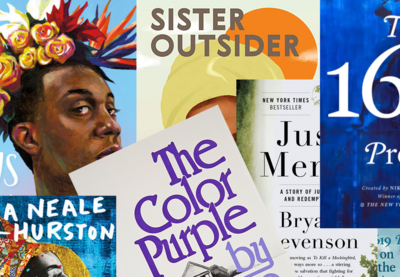Banned Books Week 2025
Censorship and threats to civil liberties are intensifying in the United States. To strengthen our democracy, we must resist campaigns that aim to ban books, exclude participation and censor social justice in education. It’s crucial now more than ever to advocate for learning — in communities and schools — that is inclusive and that promotes critical thinking.
Stories are a deeply meaningful way that we learn about the world, and they can build empathy and understanding of ourselves and others.
The American Library Association (ALA) reports that in 2024, more than 2,452 unique titles were targeted with demands for censorship. According to the ALA, “Pressure groups and government entities that include elected officials, board members, and administrators initiated 72% of demands to censor books in school and public libraries.”
ALA also cites factors contributing to a decrease in documented censorship, including underreporting by library workers who fear for their jobs, censorship by exclusion “when library workers are prohibited from purchasing books,” and legislative restrictions such as “state laws restricting the type of materials available in libraries and schools based on the ideas or topics addressed in the materials.”
For the 2024–25 school year, PEN America, which tracks school book bans, recorded “6,870 instances of book bans across 23 states and 87 public school districts.” PEN America emphasizes that reporting on “book bans remains a bellwether of a larger campaign to restrict and control education and public narratives, wreaking havoc on our public schools and democracy.”
The current attacks on education and books — especially those that center the experiences and perspectives of LGBTQ+ people and Black, Indigenous and other people of color — have led to fear in libraries and schools, further resulting in books being censored even when not challenged.
To resist book bans and hate in education spaces, we offer the following resources — including book reviews, stories, articles, guides, curricula and more — to help you learn, teach and advocate for education justice and a more inclusive, multiracial democracy.
[Updated Oct. 2025]
Learning for Justice Resources
Liberation Lit
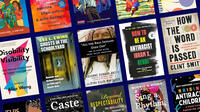
Learning can help us to resist hate and bias and counter limited narratives that have traditionally excluded diverse perspectives. These LFJ book reviews for adult readers encourage us all to keep reading and learning together for liberation.
Reading Together: Books for Children
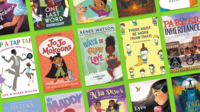
This page offers some of our favorite book recommendations for children (elementary to middle grades) that affirm identities, celebrate diversity and highlight justice. Enjoy and share them with the children in your life.
Reading for Justice: Book Reviews for Teens and Young Adults
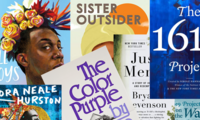
We offer some of our favorite book recommendations for teens and young adults to encourage learning and reflection in building a future that values and celebrates diversity and equity and works toward inclusivity and justice.
Story Corner
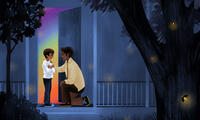
These short stories are for growing readers and for reading aloud to young children. Enjoy our most recent addition for children and families, “Fireflies,” a story about family, love and identity that gives children affirming messages and offers a model to adults on responding to a child questioning their sexual orientation or gender identity.
Growing Together Series: For Children and Families
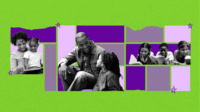
The learning activities and stories in this series for children and families can begin a child’s journey toward helping to create a more just society.
Learn From and Honor Black History
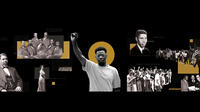
Black history is central to our nation’s story. Children deserve to learn this history in all its complexity — and in ways that are accurate, comprehensive and age appropriate. These resources can help celebrate, teach and learn from Black history and experience all year.
Resisting Hate in Education Series
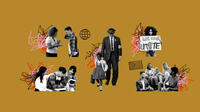
This resource series offers strategies for prevention, intervention and response to hate and bias in education. Together, we can engage as a broader community across our differences, build networks to foster resilience and take action to resist hate.
Education Justice Series
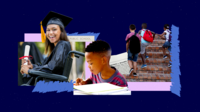
Public education is an essential common-good service and a cornerstone of democracy. This series can help us recognize damaging policies and practices and formulate strategies to ensure equitable public education.
Resources for Educators
Teaching Hard History podcast series
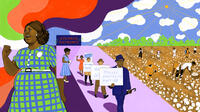
Efforts to dismantle public education and to erase and alter our country’s history have intensified, making this podcast series on the hard history of the United States even more essential now. From LFJ and host Hasan Kwame Jeffries, Ph.D., this four-season podcast series brings us the crucial history we should have learned through the voices of leading scholars and educators.
Advocating for Teaching Honest History: What Educators Can Do
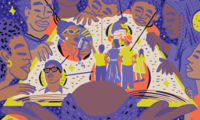
Learning honest history — history that is accurate, comprehensive and inclusive of perspectives beyond traditional, dominant narratives — helps us all to understand the forces that shape our world and to make connections between the past and the present. This guide for educators offers resources and tools for teaching honest history and strategies for advocating for honest history education.
Teaching the Civil Rights Movement framework
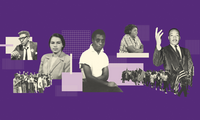
This framework centers Black Americans’ struggle, while pointing out the ways in which white supremacy was institutionalized — across multiple levels of society — to deny political, social and economic equality to Black people. By engaging young people in a more inclusive history and activist pedagogy, students can make connections between past and present, recognizing the relevance of history to today’s justice and civil rights movements.
Teaching Hard History: American Slavery framework
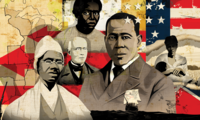
Most students leave high school without an adequate understanding of the role slavery played in the development of the United States — or how its legacies still influence us today. In an effort to remedy this, we developed a comprehensive guide for teaching and learning this critical topic at all grade levels.
A Care Plan for Honest History and Difficult Conversations
A research-based approach for strategies of care that educators, parents and caregivers can practice when teaching honest history or engaging in difficult conversations.
Diversifying Classroom Texts webinar
Join antiracist education experts and Learning for Justice for this thought-provoking webinar that highlights the importance of diversifying classroom texts.
Debbie Reese on Book Bans and Native Representation
Scholar Debbie Reese talks book bans and the fear of a just society.
Teaching Ideology and Banned Books
Helping students understand how ideology influences decisions allows them to be more thoughtful and engaged participants in society. Examining banned books is one way into that awareness and engagement.
Humanizing Asian Americans in the Classroom Through Children’s Literature
Asian American stories are often absent from classroom libraries. In this article, one educator explains why this omission is so harmful — and recommends ways to fix it.
Celebrating Banned Books Means Advocating for LGBTQ Texts
During #BannedBooksWeek, educators should look to the present as well as the past.
EXTERNAL RESOURCES
PEN America : The Normalization of Book Banning
Report on book banning and censorship in the 2024-25 school year.
American Library Association 2024 Book Ban Data
Data from ALA’s Office for Intellectual Freedom on book bans.
Fight Censorship
Additional resources and information from the American Library Association.
Books for All
This page from the New York Public Library urges visitors to “protect the freedom to read in your community.”
Books Unbanned
This initiative by the Brooklyn Public Library provides resources to fight against book bans, censorship and political challenges that affect local libraries.
Freedom To Learn
The African American Policy Forum developed an initiative to oppose attacks, in the United States and elsewhere, waged on educational frameworks that address structural inequality, including intersectionality, critical race theory, Black feminism and queer theory.
Banned & Challenged Books
Statistics and other resources from the American Library Association about banned and challenged books in the United States.
